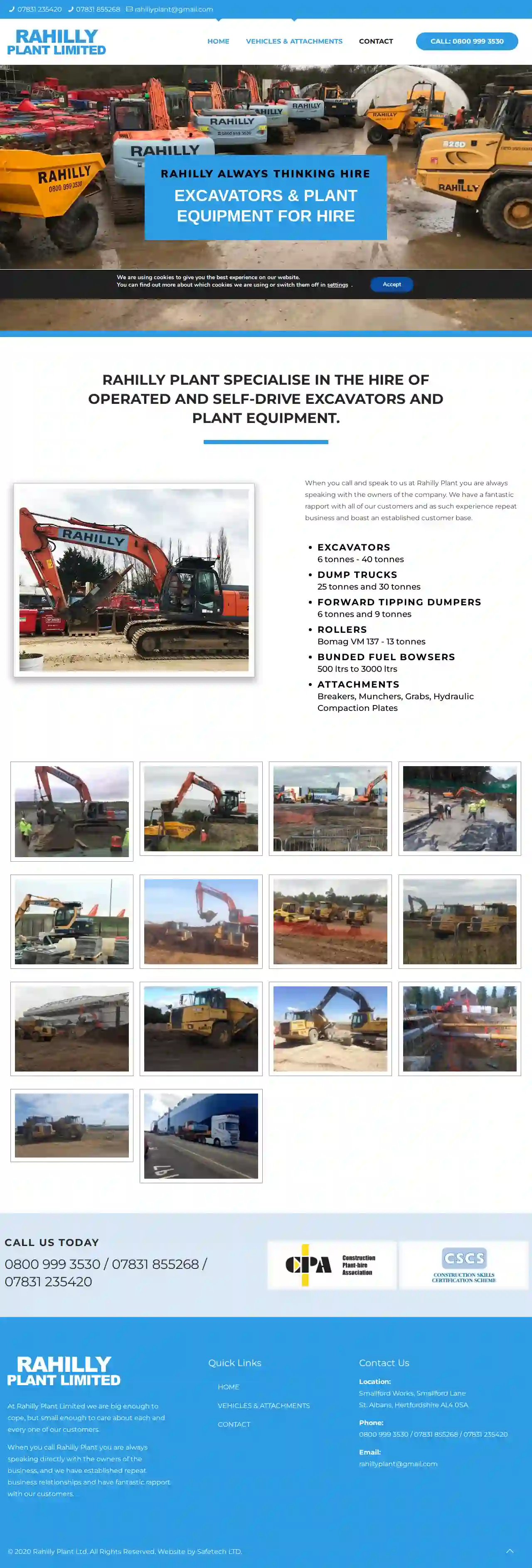Demolition Contractors Cheam
Find top Demo Contractor in Cheam
Receive 3 FREE Demolition Contractors quotes for your project today! Compare profiles, reviews, accreditations, portfolio, etc... and choose the best deal.

Rahilly Plant Ltd
55 reviewsSmallford Works, Smallford Lane, St. Albans, AL4 0SA, GBRahilly Plant: Your Trusted Partner for Excavator and Plant Equipment Hire Rahilly Plant specializes in providing high-quality operated and self-drive excavators and plant equipment for hire. We are a family-run business with a strong commitment to customer satisfaction. When you call Rahilly Plant, you're always speaking directly with the owners, ensuring personalized service and a deep understanding of your needs. We pride ourselves on our fantastic rapport with our customers, which has led to a loyal and growing customer base. We are dedicated to providing reliable equipment and exceptional service, making us the go-to choice for your construction and excavation projects. At Rahilly Plant, we are big enough to handle your project, but small enough to care about each and every one of our customers. We are committed to building long-term relationships based on trust and mutual respect.
- Services
- Why Us?
- Gallery
Get Quote
Clive Charles Construction
3.73 reviews31A Frogmore, Park Street St Albans, St Albans, AL2 2NG, GBINSPIRE, CREATE, DELIVER Clive Charles is a proven established Prime Residential/fit-out contractor with over 35 years of delivering the utmost quality. With an extensive portfolio of successfully completed projects, including the finest Listed period buildings to cutting edge contemporary residences throughout London and the UK. From concept to completion, Clive Charles maintain close relationships with the client and appointed team working collaboratively to fulfil all project objectives striving to exceed the highest expectations. "With over 30 years experience in the super prime refurbishment market, we deliver quality with efficiency and pride."
- Services
- Why Us?
- Gallery
Get Quote
Linnets Construction
51 reviewsSutton, GBAbout Us Linnets Construction is a family-run business with over 30 years of experience in building and landscaping services. We are committed to providing reliable, knowledgeable, and meticulous service to our clients. We offer free surveys, advice, and quotations to ensure you have all the information you need to make informed decisions about your project. Where we're based We are based near St Albans and also cover areas such as Harpenden, Luton, Hatfield, Welwyn, Welwyn Garden City, Hitchin, Watford, Radlett, Borehamwood, Brookmans Park, Hemel Hempstead, Berkhampstead and North London.
- Services
- Why Us?
- Gallery
Get Quote
St Albans Basement
4.610 reviewsSutton, GB- Services
- Why Us?
Get Quote- Ki
Kilkern
4.25 reviewsSutton, GB- Services
- Why Us?
Get Quote - Jo
John Sisk & Son
3.219 reviewsSutton, GB- Services
- Why Us?
Get Quote - R
R J GROUNDWORKS
Sutton, GB- Services
- Why Us?
Get Quote 
RJ Deamer Groundworks
Sutton, GB- Services
- Why Us?
Get Quote- AB
AB Construction Group Ltd.
52 reviewsSutton, GB- Services
- Why Us?
Get Quote - Ve
Verulamium Park
4.7Sutton, GB- Services
- Why Us?
Get Quote
Over 13,059+ Excavation Contractors on our directory
Our excavation providers operate in Cheam & beyond!
ExcavationHQ has curated and vetted the Best Excavation Companies near Cheam. Find a top & trustworthy pro today.
Frequently Asked Questions About Demolition Contractors
- Dust Suppression: Use water spraying, misting systems, or other dust suppression techniques to control airborne particles.
- Noise Barriers: Erect temporary noise barriers around the demolition site to reduce noise transmission to nearby properties.
- Work Schedule: Schedule noisy demolition activities during permitted hours to minimize disturbance to neighbors.
- Communication: Keep neighbors informed about the demolition schedule and any potential disruptions.
- Experience: Look for companies with a proven track record and years of experience in the demolition industry.
- Licensing and Insurance: Ensure the contractor is properly licensed to operate in your area and carries adequate insurance to protect you from liability.
- Safety Record: Inquire about their safety protocols and accident history. A reputable contractor prioritizes safety.
- References and Reviews: Ask for references from past clients and check online reviews to gauge their reputation and customer satisfaction.
- Professionalism: Choose a company that communicates clearly, provides detailed estimates, and has a courteous and responsive team.
- Permits and Regulations: Obtain all necessary demolition permits and comply with local building codes and environmental regulations.
- Contracts: Have a clear and comprehensive contract with the demolition contractor outlining the scope of work, payment terms, and liabilities.
- Environmental Laws: Comply with environmental laws regarding hazardous material removal, waste disposal, and pollution control.
- Neighboring Property Rights: Respect neighboring property rights and take measures to prevent damage or disruption to adjacent properties.
- Worker Safety: Adhere to worker safety regulations and provide a safe working environment for demolition crews.
How can I minimize the dust and noise from demolition?
How do I find a reputable demolition contractor?
What are the legal considerations for demolition projects?
Do I need a permit for demolition?
How can I minimize the dust and noise from demolition?
- Dust Suppression: Use water spraying, misting systems, or other dust suppression techniques to control airborne particles.
- Noise Barriers: Erect temporary noise barriers around the demolition site to reduce noise transmission to nearby properties.
- Work Schedule: Schedule noisy demolition activities during permitted hours to minimize disturbance to neighbors.
- Communication: Keep neighbors informed about the demolition schedule and any potential disruptions.
How do I find a reputable demolition contractor?
- Experience: Look for companies with a proven track record and years of experience in the demolition industry.
- Licensing and Insurance: Ensure the contractor is properly licensed to operate in your area and carries adequate insurance to protect you from liability.
- Safety Record: Inquire about their safety protocols and accident history. A reputable contractor prioritizes safety.
- References and Reviews: Ask for references from past clients and check online reviews to gauge their reputation and customer satisfaction.
- Professionalism: Choose a company that communicates clearly, provides detailed estimates, and has a courteous and responsive team.
What are the legal considerations for demolition projects?
- Permits and Regulations: Obtain all necessary demolition permits and comply with local building codes and environmental regulations.
- Contracts: Have a clear and comprehensive contract with the demolition contractor outlining the scope of work, payment terms, and liabilities.
- Environmental Laws: Comply with environmental laws regarding hazardous material removal, waste disposal, and pollution control.
- Neighboring Property Rights: Respect neighboring property rights and take measures to prevent damage or disruption to adjacent properties.
- Worker Safety: Adhere to worker safety regulations and provide a safe working environment for demolition crews.